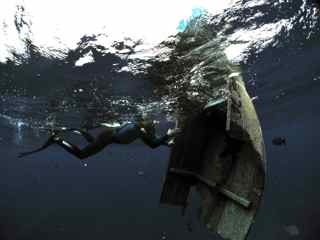Washed out to sea
 The entire crew was on deck looking for the whale Tracey had just spotted and I immediately saw a white object near the horizon. Thinking it was spray from the whale’s blowhole, I wondered why it looked so solid. As we sailed toward the surfacing animal there was something blue near its head. Then we realized it wasn’t a whale at all—it was half of a derelict boat.
The entire crew was on deck looking for the whale Tracey had just spotted and I immediately saw a white object near the horizon. Thinking it was spray from the whale’s blowhole, I wondered why it looked so solid. As we sailed toward the surfacing animal there was something blue near its head. Then we realized it wasn’t a whale at all—it was half of a derelict boat.
In the cerulean water surrounding the boat, over fifty fish swam around the enormous piece of debris. Some of them—bright yellow and black striped reef fish—are hundreds of miles from their natural habitat. The boat was torn in half and the inside was painted a vibrant turquoise—the blue that we’d seen in the distance. Along both sides of the boat were Japanese characters and on one side were the numbers 13-16. I was surprised at the lack of algae encrusting the boat, which could be another sign that the boat hasn’t been in the water very long.I had the startling realization that as we gaped and gawked, took photos and videos of the boat, its owners may be crossing a busy street in Japan, cooking a pot full of noodles at home or going about any number of routine daily tasks, their boat a long forgotten memory, or the far worse thought, that they might not be doing anything—that their voyage in this boat was their last. It’s strange to look at remnants of towns that have been razed or to collect objects that were important parts of people’s lives. We’ve only sampled a fraction of the debris field and detritus from the Tohoku earthquake will remain at sea for years until other seafarers like us stumble upon them.
We’re like tourists in a forgotten city, a city whose landscape is transformed each day with the movement of the waves. This watery Pompeii, eloquent but impermanent, conveys the somber aftermath of natural disasters and how easily we wipe them from memory when another story makes front page headlines.
This wasn’t the first tsunami off Japan’s coast and it won’t be the last. But swimming inside that boat, wondering about its owners somehow made it real. The question is: how do we turn this memory into a catalyst to act, to move, to adapt before the next disaster is upon us.
whoa linz, this is so moving! I love this piece. Keep up the good work out there!